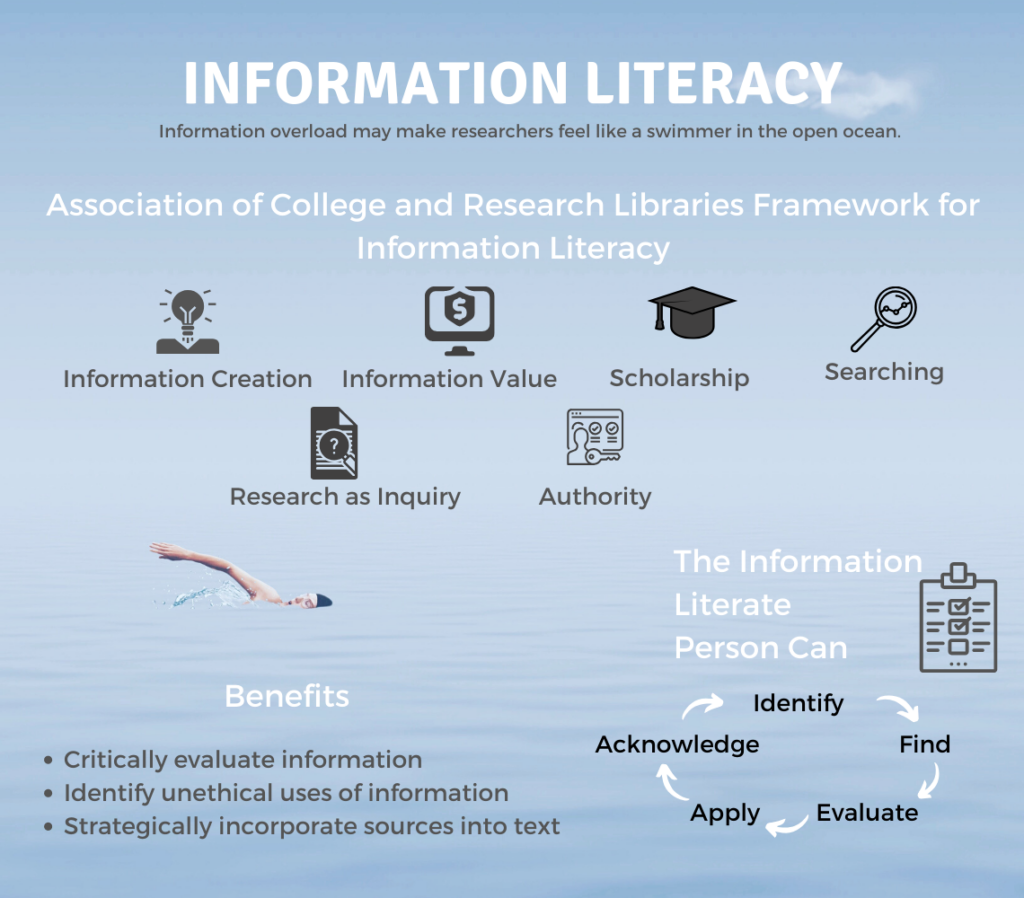Information literacy can be defined as a critical perspective, point of view, or framework that guides how people consume, evaluate, produce, use, and archive information. It can also be seen as a cluster of core, interconnected competencies people possess to identify, find, evaluate, apply, and acknowledge information.
“Information literacy empowers people in all walks of life to seek, evaluate, use and create information effectively to achieve their personal, social, occupational and educational goals. It is a basic human right in a digital world and promotes social inclusion in all nations” (“Information Literacy.” United Nations Educational, Scientific and Cultural Organization. 2005).

The information-literate person should be able to:
- Understand the need to use information and define your research topic
- Identify the range of information resources available
- Locate and access information using different library collections
- Use search tools to locate relevant information by applying effective search strategies
- Identify and use subject specific library databases
- Use information independently and critically
- Locate and evaluate quality information on the web
- Cite information and use it in a responsible and ethical manner
Additionally, to be truly information literate requires that you simultaneously develop an awareness of the following:
- How you engage with the digital world
- How you find meaning in the information you discover
- How to articulate what kind of information you require,
- How to use information ethically
- The role you play in the communication of your profession
- How you evaluate information for credibility and authority
For more information on what it means to be information literate, watch the following video “The Five Components of Information Literacy” from Seminole State Library:
Why Is Information Literacy Important?
Through information literacy, we learn to recognize that not all information is created equal. For instance, content on the internet continually grows, but it doesn’t always come from credible sources, as anyone can publish content for others to access. This means that there is a lot of bad or useless information to sort through when performing research. In an age of false reporting (“fake news”), it’s not always easy to determine which are credible sources and which are not, which makes becoming an information literate researcher all that more crucial. Information literacy helps us to recognize misleading, out-of-date, or false information. It also helps us sort through the data and interpret it intelligently.
Being information literate also means we’re able to:
-
-
- Recognize problems and create questions
- Make a plan for finding information and solutions
- Formulate hypotheses and make predictions
- Find information and data from books and the Internet
- Evaluate the credibility of the sources (i.e. is the material peer-reviewed or held to an ethical standard?)
- Organize and synthesize all gathered information
- Make conclusions and process understanding
-
Watch the following video on information literacy from Southern Maine Community College:
Additional Resources
- “Five Components of Information Literacy,” a brief video from Seminole State Library
CHAPTER ATTRIBUTION INFORMATIONMoxley, Joseph. "Information Literacy." Writingcommons.org. [License: CC BY 4.0] "What You Need to Know about Document Design." Uploaded by SMCC Library, 16 Aug. 2016. YouTube.com. |

